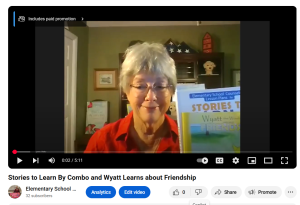The Heart of Friendship: Nurturing Empathy in Young Hearts
In an elementary school, friendships play a pivotal role in shaping a child’s social and emotional development. As elementary school counselors, our mission is not only to address academic concerns but also to nurture the emotional intelligence of tomorrow’s leaders. One crucial aspect of this emotional intelligence is empathy—the ability to understand and share the feelings of others.
The Significance of Empathy in Friendship
Research consistently highlights the link between empathy and positive social relationships, with empathy acting as a cornerstone for building and maintaining friendships. In their formative years, children are actively shaping their capacity for empathy, and school environments can play a pivotal role in fostering this crucial skill.
Here’s How:
- Promote Inclusive Activities: In classroom lessons, encourage activities that foster collaboration and teamwork, such as group projects or team-based games. This creates opportunities for students to understand different perspectives, share ideas, and work towards common goals. A great book to read: Spaghetti in a Hot Dog Bun by Maria Dismondy.
- Storytelling and Literature: Use the power of story to explore diverse characters and situations, encouraging discussions about characters’ emotions and motivations. Reading and discussing books that address empathy can provide students with a safe space to explore and understand different perspectives. A great book to read: Wyatt the Wonder Dog Learns about Friendship, by Lynne Watts
- Role-Playing and Perspective-Taking: Incorporate role-playing activities that allow students to step into the shoes of others. By actively engaging in scenarios that require perspective-taking, children can develop a deeper understanding of emotions and build empathy for their peers. A great book to read: Just Ask! Be Brave, Be You by Sonia Sotomayor
- Mindfulness and Emotional Awareness: Introduce mindfulness exercises that help students become more aware of their own emotions and, by extension, the emotions of others. Mindfulness practices can enhance emotional regulation and create a more empathetic and compassionate school culture. Wyatt the Wonder Dog Learns about Listening by Lynne Watts
- Community Service and Collaboration: Engage students in community service projects that promote empathy by connecting them with real-world issues and allowing them to contribute positively to the community. Collaborative projects can instill a sense of responsibility and compassion for others. A great book to read: Mama Panya’s Pancakes by Mary and Rich Chamberlin
As elementary school counselors, we have the power to shape the future by nurturing empathy in the young hearts under our care. By incorporating these evidence-based strategies into our school environments, we can create a foundation for positive friendships, emotional well-being, and a compassionate community that extends far beyond the classroom walls. The heart of friendship lies in the cultivation of empathy, and it is our shared responsibility to ensure that every child has the opportunity to develop this essential skill for a more positive and harmonious future.

